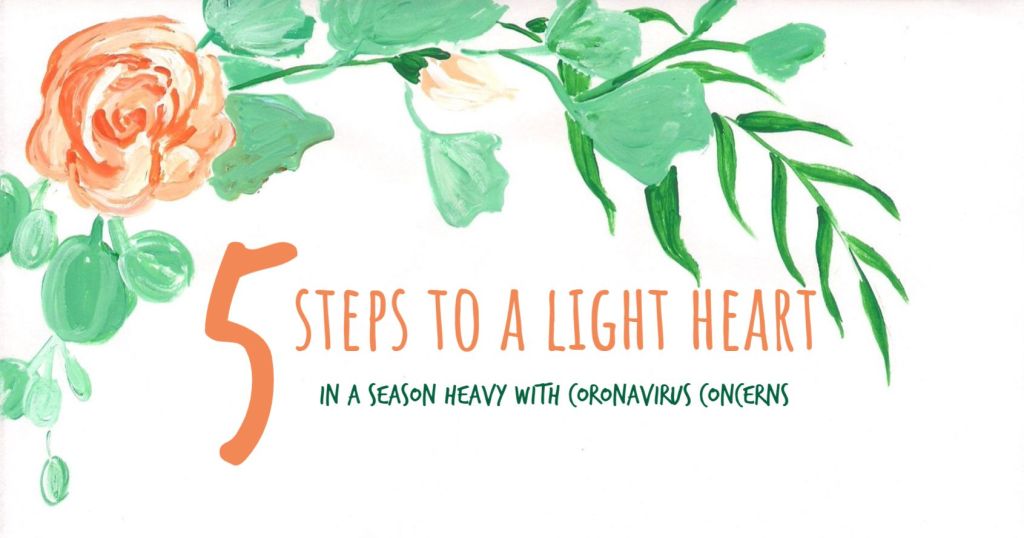
The Coronavirus Concerns are Valid
This week I have been irritable.
At my husband, at my son when he constantly asks me for snacks, at myself because I knocked a whole roll of toilet paper into my washer without noticing AND WASHED IT in the middle of a toilet paper crisis. At my sweater because I couldn’t get it onto the clothes hanger the first try.
That was the indicator that let me know this wasn’t really about my husband or my son or the TP or my sweater. The small situations were not causing me to be bothered, they were revealing that I am bothered by something deeper.

My heart has been heavy over all the unknowns and precautions and trying to walk the fine line between wisdom and paranoia. The scientific community is making progress on treatment possibilities, but they’re still in the clinical trials stage. Models suggest that the measures we have taken will help keep healthcare resources available to the severely ill, but that this scenario our world is in will not resolve quickly.
Meanwhile, I’m concerned about our investments, unsure about our income and our economy, aware of the threat that looms over the vulnerable people I love. I’m wrestling with how powerless I am to protect them. I’m angsty over how long I may have to go without social interaction. I’m unnerved by the opinions and interactions on social media that are growing sharper as the disease spreads and the stress sets in. I feel all my plans growing less and less likely in the coming months.
As painful scenarios leave the hypothetical and start to rip their way into our reality, it’s more challenging to dismiss my concerns. The coronavirus concerns are valid.
And they are heavy.

Is it as simple as “Just don’t worry about it?”
I have been sitting with this verse.
“Give your burdens to the Lord,
and he will take care of you.
He will not permit the godly to slip and fall.”
I love that I am not asked to wildly abandon my concerns as if they’re just in my head. It’s one thing to hear “just don’t worry about it” when I’m fretting over unlikely possibilities and I actually do need to lighten up. But when I’m bearing heavy situations and high risks and a great deal of loss is at stake, it’s not that simple.
If I am to shift the weight off my shoulders, I must know these things have been delegated carefully into the hands of one who is equally invested in their importance and is competent to manage them.
I think that’s why this verse connects with me so well. It’s not an over-arching, “just stop being so concerned” message. It’s a personal and specific invitation to name those things that burden my heart and give them directly to the One who promises to take care of me.

When my troubles have shifted onto the plate of someone in whom I have great confidence, they can remain unsolved and yet my heart can be light. It’s a matter of who I think is called to handle the situation.
One Finger At A Time
I am a worrier and an overthinker and a plan-ahead-er, so one truth that has made a huge practical difference in my life is this: “Be anxious for nothing” is not a matter of personality, it’s a matter of obedience.
With the ever-evolving concerns we are facing, I have been trying to wrap my mind around the how of obeying that command.
I know when something has stolen my focus and has my mind over-analyzing and my heart burdened. I know in that same moment that I should not be focusing, over-analyzing, or holding onto that burden. I struggle with how to let go.

How do I get from Point A: anxious, to Point B: not anxious?
How do I loosen my white-knuckle grip on the things that I cannot stop caring deeply about? In the midst of a hard situation I’m likely to be in for a while, what are the day-to-day steps to a light heart?
First, I think I have to recognized that by letting go of them, I am giving them to someone who is able to do a better job managing the situation than I can.
Second, because the worries will keep re-surfacing in my mind, I must capture those thoughts and link them to heart-steadying truth. That way, the next time they show up, they actually serve me. I want practical replacement thoughts – mental resets that guide my mind back to solid reassurance, so that as these concerns arise, while I do whatever it is I need to do, I also settle back into how I am well taken care of. I take the threat seriously, but I live with a light heart.
Finally, I think it’s easiest to let go one finger at a time.

So, in a season heavy with coronavirus concerns, I identified 5 areas where I felt irritation, worry, frustration and fear surfacing in my heart and my thinking.
This is my tool so that each time I feel myself growing tense, restless, and heavy as I walk through the weeks ahead, I can glance at my hand with its 5 fingers, or at this handy, short-and-sweet printable on my fridge and count down 5 steadying steps that help me let go of one specific area at a time.
Five Steps to a Light Heart

When I feel concerned over how this situation will affect my:

I will offer sacrificial love freely and lay down my expectations.
Any time stress is heightened, we feel that tension in our relationships. Because it’s easy for me to obsess over rough interactions with other people and stress over whether we are okay or not, I want to be careful about how much time and attention those relationship dynamics get in my heart. I think the truth I can sit with is this: when people are not fine, their interactions suffer, and a lot of people are not fine right now. I can’t necessarily count on the reassurance, attention and company I want from other people. But I can shift my thinking from what I can GET to what I can GIVE. I can release people to just be where they’re at and keep offering them grace rather than fixating on hurt, surprise or disappointment when they don’t respond to me how I expect them to.

I will delight in how they are precious to me and pray for their protection.
This area probably hits the hardest: the threat of losing our loved ones. I don’t know what will happen, but today, I want to appreciate those who are precious to me rather than living in dread of losing them. I will cherish the people that God has put in my life and thank him for the gift that they are. I will praise him for providing a way for us to continue our relationships in eternity, with all the time in the world and none of the struggle or pain or physical ailments to get in the way of enjoying each other; even if he allows us to be separated for a time. And while I recognize that God’s goodness, provision and protection do not always look like I expect them to[1], I will remember that He is capable of keeping my people safe and healing their bodies if they get sick. He listens intently to my every request, so I will pray and pray and pray for Him to protect them as often as they come to mind.

I will think of one way God has taken care of me in the past and release my desire to see and control the future.
And I said, “This is my fate;
the Most High has turned his hand against me.”
But then I recall all you have done, O Lord;
I remember your wonderful deeds of long ago.
They are constantly in my thoughts.
I cannot stop thinking about your mighty works.
Because God has not let me in on all the details of his plan for my future, it is easy for me to grow fearful and skeptical as I face the uncertainty ahead. It is tempting to expend all of my energy searching for some clue as to how this will go so I can prepare perfectly. When things seem to take a turn for the worst, I can start to wonder if He’s on my side at all. But one of the most effective things to settle my frustrated, searching heart is to stop and remember one way God has specifically cared for me in the past. This is the God that has revealed his heart for me, intervened for me and worked on my behalf in so many creative and varied ways. When I cannot predict his plan, I must return to the evidence of his character. When I’m unsettled over a future I cannot see or control, I will trust the heart of the One who can see and control all that is to come.

I will name how my needs have been met today and ask God to faithfully meet my needs tomorrow.
When I’m used to God meeting my needs one way, I can grow attached to how things work right now and be really thrown by major changes. But God often uses these transition periods when my fine-tuned system no longer functions to help me see that I have stopped looking to him for help; I have shifted my trust to my system, my ability, and my management. He lovingly allows my systems to break down so that I will learn that he is just as able to provide for me in a new way. The changes I’m adjusting to did not catch him by surprise. When my thoughts drift to my finances and I start trying to calculate if we will be okay, I will stop and ask this question: Do I have what I need today? I will name the things I notice that God has already put in place, on this day. I will remember that, whatever is next, he is able to provide what I need, maybe in a new way I haven’t yet thought of. I will lay down my calculations and ask him for help, because he is faithful to answer the one who waits on him.
“I am the Lord who opened a way through the waters, making a dry path through the sea…But forget all that – it is nothing compared to what I am going to do.”
“So don’t worry about these things, saying, ‘What will we eat? What will we drink? What will we wear?’ These things dominate the thoughts of unbelievers, but your heavenly Father already knows all your needs.”

I will rest in the freedom I have been given to just do my best. I will think of how to love people instead of how to impress them.
Comparison kills us: whether it’s how you’re handling your kids’ educational needs; whether you’re still running errands or in full-on quarantine; whether you have the opportunity to work from home or must brave the public workplace. We all feel the expectations of others, and there’s a lot of guidelines and opinions out there. It can make me feel crushed and like there’s no right answer. But I believe that in this, just like in any season, we have been given the freedom to start each day, hold it before the Lord, and ask him to guide us step by step. I’m just not going to get a 100% approval rating with how I end up performing in that, but one of the most freeing things ever is knowing that I don’t have to be on the same page as someone else to take care of them, to be kind to them, to sacrificially work for their good. So I will lay aside the burden to impress others, take up the calling I’ve been given to love them, and then just do the best I can before an audience of One.
“The Lord directs the steps of the godly. He delights in every detail of their lives.”
“Since we are living by the Spirit, let us follow the Spirit’s leading in every part of our lives. Let us not become conceited, or provoke one another, or be jealous of one another.”
[1] A thought Lysa Terkeurst does a great job exploring in her awesome Trustworthy Bible study













